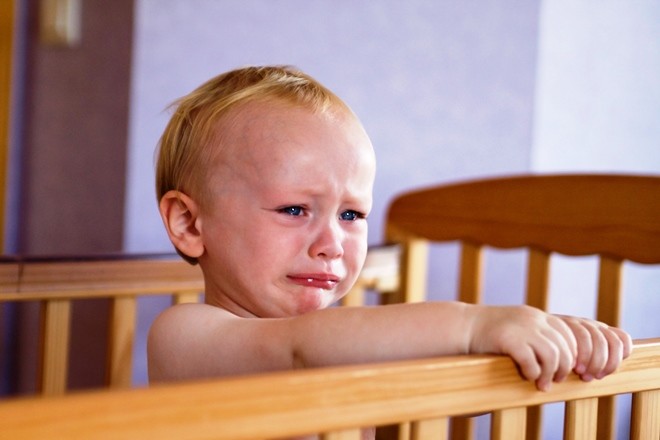British scientists again distinguished themselves. They do not seem to be fed with bread - let them do some funny research: then they find out why people have sex, then they study the effect on the brain of eating cornflakes. But this is not bad: there are more and more reasons for jokes. And then a new study arrived: the scientists quite seriously found out where the children cry most of all. Photo:GettyImagesScientists from the University of Warwick asked themselves this question. Trying to create a "baby cry map", they found that babies cry the most in the UK, Canada and Italy. In Britain, babies cry for three hours a day at least three times a week. Yes, you can't envy them. The rest of the top "crybaby chart" whines less, but still a lot. According to a report published in the professional medical journal "Pediatrics", the calmest children are born in Denmark, Germany and Japan. There were no Russian children in the chart - however, we already know that our babies are the best. Scientists analyzed data from 28 studies in which 8,700 children participated. Their goal was not to study whininess, but the prevalence of colic in infants. And one without the other, as we understand, is impossible. All babies have stomachaches, this phenomenon is generally normal and harmless - for babies. But quite difficult for parents. - How much children cry in the first weeks of life varies greatly depending on the country. More attention should be paid to studying those cultures where children cry less, - says the head of the study, Professor Dieter Wolke. According to scientists, the level of crying depends on the level of social security in a particular country, traditions of child care, feeding patterns. Here, for example, is the difference between London parents and Copenhagen: in Denmark, mothers and fathers hug their children more often, carry them in their arms - in general, they are fans of tactile interaction. And it seems to work! In addition, in England, almost 75 percent of women breastfeed their children after childbirth, but after two months, only half of mothers are nursing. And this is also important. However, scientists reassure parents: no matter what care and feeding pattern you adhere to, after one and a half to two months after birth, the intensity of colic will begin to subside. And children will cry much less.
Photo:GettyImagesScientists from the University of Warwick asked themselves this question. Trying to create a "baby cry map", they found that babies cry the most in the UK, Canada and Italy. In Britain, babies cry for three hours a day at least three times a week. Yes, you can't envy them. The rest of the top "crybaby chart" whines less, but still a lot. According to a report published in the professional medical journal "Pediatrics", the calmest children are born in Denmark, Germany and Japan. There were no Russian children in the chart - however, we already know that our babies are the best. Scientists analyzed data from 28 studies in which 8,700 children participated. Their goal was not to study whininess, but the prevalence of colic in infants. And one without the other, as we understand, is impossible. All babies have stomachaches, this phenomenon is generally normal and harmless - for babies. But quite difficult for parents. - How much children cry in the first weeks of life varies greatly depending on the country. More attention should be paid to studying those cultures where children cry less, - says the head of the study, Professor Dieter Wolke. According to scientists, the level of crying depends on the level of social security in a particular country, traditions of child care, feeding patterns. Here, for example, is the difference between London parents and Copenhagen: in Denmark, mothers and fathers hug their children more often, carry them in their arms - in general, they are fans of tactile interaction. And it seems to work! In addition, in England, almost 75 percent of women breastfeed their children after childbirth, but after two months, only half of mothers are nursing. And this is also important. However, scientists reassure parents: no matter what care and feeding pattern you adhere to, after one and a half to two months after birth, the intensity of colic will begin to subside. And children will cry much less.

Making Money with Desserts: Success Stories
Evgeniya Polischuk (Fedutinova) instagram:@evgeniyafedutinovavk.com/janeshomebaking– It all started with baking for family and friends. Gradually, I started posting photos of my baked goods on Instagram – and orders started coming in. I made my first custom-made cake on October 13, 2014, and a little earlier I started making macaroons and cupcakes. You could say that the business “found me”, I am very […]

Soups are cold recipes with photos
Cold cucumber soup with yogurt and lemonsorbet from the chef of the restaurant La Taverna Alexander Zhurkin Photo: Getty Images Ingredients: Plain yoghurt – 125 g Cucumber – 150 g Lemon/lime sorbet – 50 g Cocktail shrimp – 24 g Fresh ginger juice – 1 g Lime juice – 5 g Fresh orange juice – 5 g Parsley – 1 g Pink pepper – 1 g Watercress – […]

barbeque kebab
Pork tenderloin in glaze Photo:Dmitry Bayrak/dbstudioPreparation time: 20 minutes + marinating time.Calories: 454 kcal per serving.For 4 servings: 4 pork tenderloins (approximately 300 g each), 1 onion, 2 cloves of garlic, 1 tsp. lemon zest, 1 tsp. lemon juice, a pinch of ground cumin, coriander and turmeric, 1 tbsp. vegetable […]

Pierre Duacan: dietary recipes: Ducane diet
Beetroot soup Photo:Season’S, Luxury Hotels RepresentationYou will need:· Boiled beetroot – 60 g· Fresh cucumbers – 20 g· Red radish – 20 g· Green onions – 10 g· Egg – 1 pc.· Drinking mineral water – 200 g· Salt – 1 gPreparation:· Boil the egg and beetroot.· Grate the cucumbers, radish and part of the beetroot. Put everything […]





